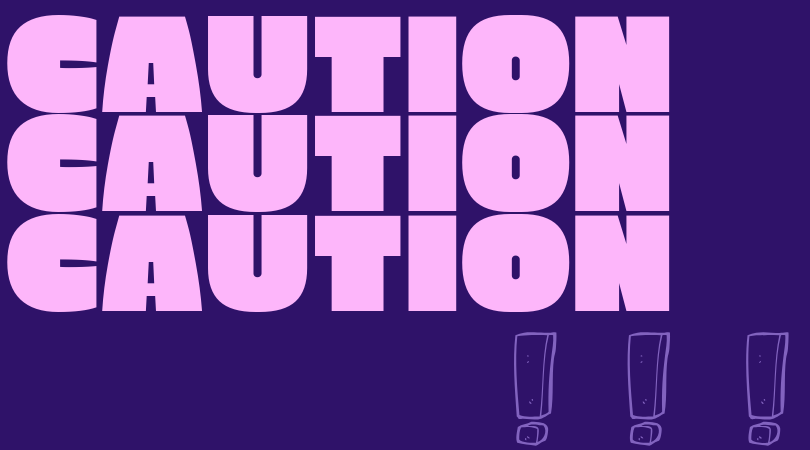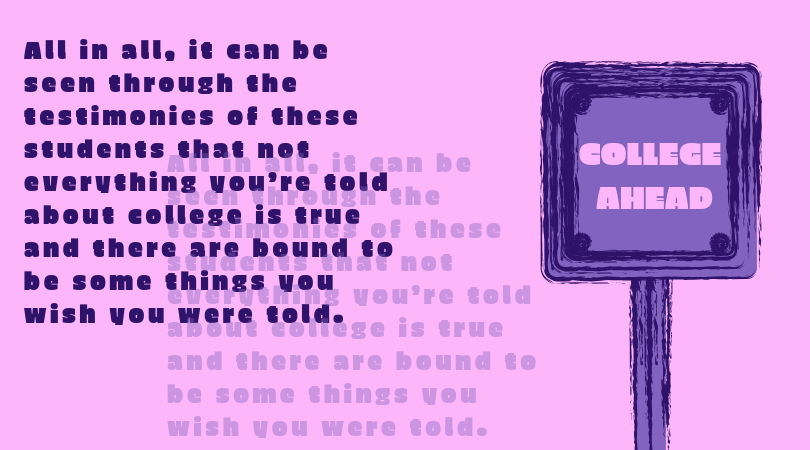Things I Wish Someone Had Told Me Before I Started College
Words by Matthew Romano
Illustration by Katie Herchenroeder
The day was September 19, 2016. I was sitting on the radiators outside of the student cafeteria packed like a sold-out MSG concert or the 4 train at 161st on Opening Day thinking about the things I had learned in my first 3 weeks of college at CCNY. But it was not anything about what I had learned in classer; rather, it was everything I had learned outside of classes. I took to Facebook to record what I had learned, headlining it “Things I wish someone had told me before I started College.” I will start by sharing just a few of the funnier ones that I had posted below.
- Lunch is eaten on radiators outside of the packed student lunchroom
- There is a certain beauty, but also a madness, in long breaks between classes
- You will have to physically “RUN” to class: across streets, up and down escalators and stairs, and down long confusing hallways around floods of people.
I had intended to do a series of installments on this verytopic but, as I came to learn happens often, responsibilities soon tookdominion over my mind and schedule and I ended up with only 3 posts. Now,writing for The Campus has given myfellow colleagues and I an outlet to voice things we learned the hard waythrough our college careers. What follows are a list of 5 things that myselfand some other CCNY students say we wish we were told before entering thisspectacularly insane 4+ year whirlwind that we call ‘college.’
Nicole Budzinski is currently a junior here at City College,having started in 2016, and is majoring in biology on the Pre-Med track. Whenasked for one thing that she wishes someone had told her before she enteredcollege, she replied with the self-described ‘basic’ answer of “How to read atextbook.” If you have ever been assigned one of those 1,000 page and whatfeels like 1,000 lb. textbooks, then you know exactly what she means by this.If you have had the good fortune of never doing so, she explains, “How toactually not read the entire thing and how to highlight and outline it well becausein High School, you don’t learn that stuff.”

As a person who is studying to become a High School English teacher,I thought, “Wow, that’s so true.” In High School, there is certainly anemphasis on reading, but not so much smart and active reading; however, incollege, there is this pervading sense that, more than anything else, the notesyou have will either make or break you. As Nicole puts it, “you need to knowwhat you don’t need to know” and those who have taken a final just to find it litteredwith all the things that weren’t in your notes, you know all too well what she means.For most college freshmen, there is that moment where you start to realize thatthe habits that got you through the toughest AP’s in High School won’t work inyour introductory college courses.
It was this moment that Nicole knew the straight facts shespit in our interview, facts that could have come in handy if someone had toldher before August came around 3 years ago. Now a junior, successfully movingthrough upper level bio classes, Nicole serves as that voice for those who arefacing or will face these situations. She tells, “I suggest talking to peopleyou know in the class about what they are studying.”
The next person to weigh in on the titular question of thisarticle was Eric Bilach, a junior studying English and literature. In ourinterview, Eric shared that there were so many ways he could go with thisquestion, ultimately deciding on one lesson he learned and wished he had beentold - one that many college students hear, but with an important and lesserrecognized caveat.
In his words, “When they tell you that ‘in college no one’s goingto hold your hand,’ it’s true, but I think there’s a difference between gettingyour hand held and getting proper guidance in spots where you just shouldn’tknow certain things because you’re just 17-18 years old.” He went on to listsome of the administrative and financial matters that college students findthemselves, often unexpectedly, having to deal with in college. He gets itright when he says that students should not be expected to have all theseanswers. Many students’ first-semester fears and future college woes have to dowith financial matters, whether it is the money they spend on books, tuition reimbursements,or financial aid and scholarship matters that they are left to navigate alone.Freshmen should not have to bear the brunt these ailments. His advice forstudents that may be dealing with the financial politics of college is contraryto people who “drive the idea that college is really hard” and the mindset ofmany that “it’s evil, it’s really difficult and that you’re going to bestressed out all the time.” He urges people to take not only the bad, but thegood that comes with knowing, “In college, you are working for yourself really.”
Britanya Hall is a sophomore double majoring in economicsand childhood education. Britanya, in words blunter than how I am going todescribe it, expressed her frustration with advising meetings she’s had whereshe felt unsupported or misled. In support of her strong stance, she cites thisinstance: “I took a class I didn’t need, Spanish class, because I didn’t knowthat doing more than 2 years of a language [in High School], I wouldn’t needone.” It is important to note that Britanya came to City College after spendingher whole life and high school career in Jamaica and the advising that she gotin City College during her freshman year was even more vital than other’s asshe didn’t have the privileged knowledge of the college system, rules,policies, etc. that many of us enjoy and take for granted.
She, led completely by what advisors told her, ended upbeing ushered in the wrong direction. She says that although she felt “droppedsomewhere” during her first semester, “Honestly, college was easier than Iexpected,” in comparison to the loads of work and responsibilities sheexperienced in High School. The advice Britanya provides for students facingsimilar situations, especially those who came in feeling similarly lost, is “Findsomeone who can help, like a club. I feel like the Teachers of Tomorrow clubhelped me.” As Vice President of theTeachers of Tomorrow, I was glad to hear that the advice we give to students isvalued and has been, at least in small part, instrumental to someone’s success.As an interviewer, I was struck the commonality between the advice she andNicole shared, to seek help through other students who can end up being yourbiggest support systems.

Finally, Antara Chowdhury, a student majoring in childhood education,shared some of her insights in contradiction to what many High School studentsare told. She holds that you can figure out your interests or what you want todo as you go through college.
Antara, who went on to share her experience being a straightA student of immigrant parents who did not “made a plan for herself,” as she suggestsfor others. Antara entered as a Pre-Med student at NYU and learned, a littletoo late for comfort, that she did not enjoy what she was doing. Her advice onthe subject? “You have to find a balance of what do you have passion for andalso what kind of path you can be on to explore that passion while making aliving.” I then shared with her that although I was lucky enough to discoverand stick with what I had a passion for, teaching English, during my first year,I know so many others like her that had to switch trajectories completely - sometimesrealizing even that it was too late to do so without compromising the timelineand goals they had set for themselves.
All in all, it can be seen through the testimonies of thesestudents that not everything you’re told about college is true and there arebound to be some things you wish you were told. If you thought to yourself,“Damn, that hits home,” consider taking some of the advice to heart. I’ll endon this note: If you have your own examples and stories and want to give them avoice, I encourage you to be that voice as there are bound to be people around youthat will appreciate, whether now or later, being told these things beforehandand how to deal with them.





